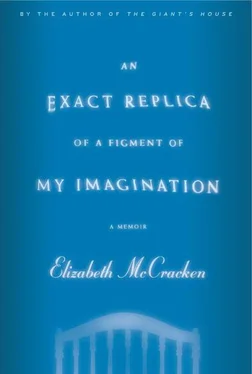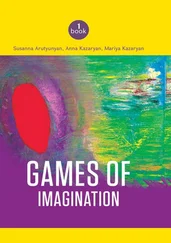But it was one of the first things we were told, after we found out that he was dead: the baby needed a name. I was sitting outside the first hospital of the day, waiting with Sylvie, the midwife who we’d found to deliver the baby. She was a sinewy woman in her midforties who spoke about ten words of English but was hugely enthusiastic. We’d just heard the bad news. I was more than forty-one weeks pregnant. It was late April and the weather was fine and it was better not to be inside any kind of medical room for the moment. Sylvie was holding my hand. Soon we’d go to a different hospital. This hospital was only for living children. They didn’t do autopsies. We needed an autopsy. Sylvie and I sat across from two teenage boys who were smoking, and more than anything I wanted to ask one for a cigarette but I didn’t.
The language of disaster is, handily, the language of the barely fluent. I kept saying to Sylvie, Je ne comprends pas. C’est incroyable. C’est incroyable . Edward was at the far end of the parking lot, calling his parents on our cell phone since we’d come to one of those moments of nothing to do.
You must find a name, Sylvie said. For the certificate.
How could we pick a name out of the handful we’d idly considered? How could we do that to him? Oh, I don’t mean to be maudlin, and I do not believe in some lousy afterlife where babies who don’t get to be born are ushered off by a kindly black-and-white angel, a real creepy Boy Scout leader of an angel. I hate that fucking angel, cupping the downy heads of all those unborn babies, almost as much as I hate the phrase “unborn baby” itself, I am trying to disbelieve him so I don’t have to look at him, but he’s lodged in my head. He’s rounding them up, he’s saying, Come here, little souls, it’s not your time yet — tell me your name — what did your parents call you?
No more talk of angels. I can’t stand the tendency to speak of dead children as such. I do not want him elevated to angel. I do not want him demoted to neverness. He was a person, that’s all.
Edward came back from the privacy of the far reaches of the parking lot, still holding the cell phone. He wasn’t crying anymore, but he had been. I told him we had to name the baby for legal reasons.
“We’ll call him Pudding,” he said, in one of those moments that sounds improbably sentimental to me now but at that moment was exactly right. A new name would be only a death name, another way to say that he hadn’t exactly existed before now. How could he suddenly be an Oscar or a Moses? How would he ever find his way, renamed like that? His parents called him Pudding, always. Even now we do. It’s the name on the certificate the city of Bordeaux gave us in early May, certificat d’enfant sans vie, certificate of the birth of a child without life — birth certificate, death certificate, whatever you want to call it. Sometimes it seems too sweet to me, but mostly I just think: that’s who he is, he’s Pudding.
I’m glad we were in a foreign country. The French probably thought it was an ordinary Anglo-Saxon name, like William, or Randolph, or George.
From the time I was a child and learned what first person singular meant, I found even the phrase itself beautiful. Most of my life, from childhood to spinsterhood, I had no pronoun problems. Partnered women with their confusing plurals turned my stomach. Who cared whether you and your beloved liked a particular restaurant in unison? Who believed that it was even possible? The love letters I intended to write would be first person and second person: I, you, never we. Even once I met and married Edward, I did my best to avoid the insidious we, which suggested we were a two-bodied, one-brained science-fiction creature, a mutant born of romance. And yet here I am, writing a book as a love letter to Edward and trying to explain — well, every time I try to get further than this into a sentence about Edward, I end up flummoxed: he was so loving and grief-stricken and so careful to set aside his pain to take care of me, and everything I write seems inadequate and sickeningly sweet. Even that last sentence feels inadequate and sickeningly sweet. We went through everything together, and writing we feels presumptuous, because he can speak for himself, and writing I feels presumptuous, because the calamity happened to both of us, was just as awful for both of us.
Ah, we. When I was pregnant both times and people referred to me and Edward as the three of you or me as the two of you, it always felt wrong. Three of us was the goal, and eventually the mostly foregone conclusion both times. But any photograph would clearly show: there were still only two of us. For the rest of my life, I think, plurals will confuse me. How many children do I have? How many are there of me?
I’m lying when I say I didn’t get much writing done when I was pregnant with Pudding. True enough for a while. Most days I woke up and had breakfast and then took another nap and then watched some television. Savary had English satellite TV, and I became addicted to the gentle afternoon reality programs of the BBC, all auctions and car boot sales. The two sofas in the main living room weren’t very comfortable, but they were deep and difficult to get out of, or so I told myself.
But when I was about eight months pregnant, I did something I’d never imagined doing: I started a memoir. Not only a memoir, but one in which I appeared frequently with my pants off. A memoir that would include the phrase my cervix, meaning mine, Elizabeth McCracken’s. What the hell: I couldn’t bend my attention to writing anything else, and I was eight months pregnant, past the danger point, so I thought, so I thought, and I began a funny book about being pregnant in France. I didn’t tell anyone except Edward and my friend Ann, because, of course: bad luck.
My great-grandfather believed in the evil eye. When registering his eleven children at school (according to his daughter, my grandmother), he would never say how many there were. When you got cocky and kept count, the evil eye could snatch away a child. This was the same reason we never decided for sure on a name, the same reason Edward and I never, not once, talked about our future with our baby without looking for a piece of wood to touch. When the pregnancy was brand-new, in Paris, we became such devoted knockers of wood that we had a hard time making any progress through the city, lurching as we did toward park benches, paneled storefronts, tree stakes, and actual trees. We would have knocked on anything . It’s amazing we didn’t fling ourselves into department stores, asking desperate directions to the furniture department, please, monsieur, quick to a bedpost, as we wondered what the wood-knocking statute of limitations was, after you had said aloud something that required it. Later Edward admitted to me that when he was alone in Bergerac, he went into the church and lit candles for Pudding’s safe arrival. He put his hand on his wooden bedside table so often that he was surprised it didn’t take on the shape of a loose glove from erosion, like a stone he’d seen in Santiago de Compostela that has been touched by centuries of pilgrims.
Pregnant with Pudding, I didn’t buy baby clothes, told my family not to buy baby clothes. And then, when I was six months pregnant, I broke down. My first purchase was two pairs of tiny baby shoes in Bergerac: a pair of loafers and some light blue leather boots with mod spaceships flying across the toes.
“I thought you weren’t going to buy anything,” Edward said.
“These are not for Pudding,” I said. “They’re for some other little boy.”
Читать дальше












